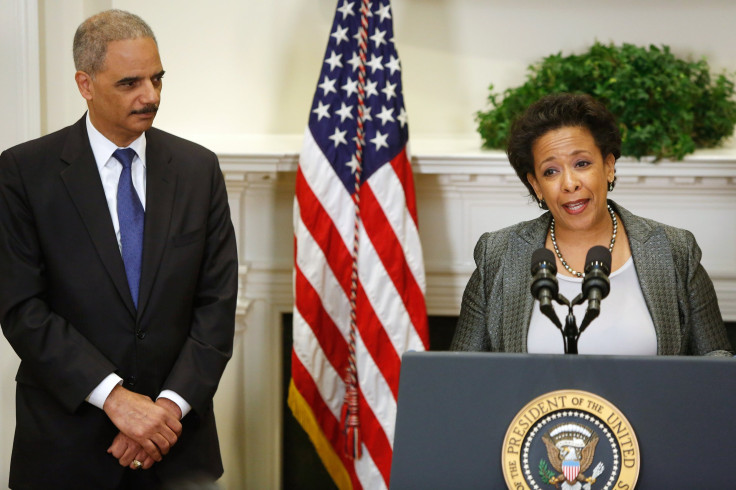Loretta Lynch And Ferguson Civil Rights Investigation: What Does Her Attorney General Nomination Mean For Mike Brown Shooting?

When U.S. Attorney General Eric Holder exits the Obama administration, one of the matters he'll be handing over to his successor is the federal investigation into alleged civil rights violations in Ferguson, Missouri. But a change at the top of the Justice Department isn't expected to impede the probe, especially because U.S. Attorney Loretta Lynch, Holder’s likely successor, shares his backstory and credentials on civil rights, legal experts say.
Lynch, the 55-year-old U.S. attorney for the Eastern District of New York, has been named as President Barack Obama’s nominee to replace Holder, who said last month he would resign and leave office when his successor is confirmed. Amid years of sparring with Republicans, his work on civil rights, including fighting controversial voter identification laws, was one of the first black attorney general’s proudest accomplishments. If confirmed by the Senate, Lynch would become the first African-American woman to lead the Justice Department.
Lynch, who grew up in North Carolina in the 1960s, is the daughter of a Baptist minister who worked to desegregate the South, Obama said last week during a news conference announcing her nomination. Her grandfather "created his own version of the Underground Railroad” by helping Southern blacks escape Jim Crow laws in the 1930s, according to a profile of Lynch in the Network Journal, an African-American publication.
“I realized the power the law had over your life and how important it was that the people who wield that power look at each situation with a sense of fairness and evenhandedness,” Lynch told the Network Journal.
It’s not just her family background that ties Lynch to civil rights, which is one of the top priorities of the Justice Department. As the U.S. attorney for the Eastern District of New York, Lynch led the successful prosecution in 1999 of Justin Volpe, a white New York City police officer. Volpe was found to have sodomized Abner Louima, a black Haitian immigrant, in a notorious case of police brutality. After her two-year term, Lynch returned to private practice before Obama renominated her as U.S. attorney in 2010. Lynch’s second nomination was confirmed in a voice vote, an indication that Republican senators did not then view her as controversial.
"Given her background and history, the law ought to protect everyone. Her prosecution in the Louima case indicates she's anti-police brutality, as she should be," said Trace Schmeltz, a Chicago-based attorney at Barnes & Thornburg LLP. He said Lynch's family history is "a classic American story" about how the rule of law was used to "hold people down and negatively impact people's lives."
Federal investigators are probing officials in Ferguson and St. Louis County for civil rights violations involving the fatal shooting of 18-year-old Michael Brown. The probe is separate from a state grand jury that is deciding whether to indict Police Officer Darren Wilson, the cop who shot and killed Brown in August.
A shakeup in the attorney general’s office will have no impact on the federal investigation because lower-level Justice Department officials are handling the probe, according to Jim Cohen, associate law professor at Fordham Law School in New York. “The attorney general, in these kinds of cases, isn’t going to review all of the subordinates’ investigations,” he said.
There is also no history of an incoming attorney general changing the course of an active investigation, said Lisa Noller, a former assistant U.S. attorney in Chicago and vice chair of Chicago law firm Foley & Lardner’s government enforcement, compliance and white-collar criminal defense practice. “There is nothing in Ms. Lynch’s background that says she will take that extraordinary step,” Noller said.
More recently, Lynch met this summer with the family of Eric Garner, the black Staten Island man who died after an NYPD officer put him in a chokehold. Garner’s death has been referenced during near-daily protests in Ferguson over the Brown shooting as another case of police brutality and racism.
As a young black attorney, Lynch said she “experienced her share of bumps and biases early in her career,” according to the Network Journal profile. “I would go out to take depositions and be mistaken for the court reporter all the time,” she said.
© Copyright IBTimes 2024. All rights reserved.





















